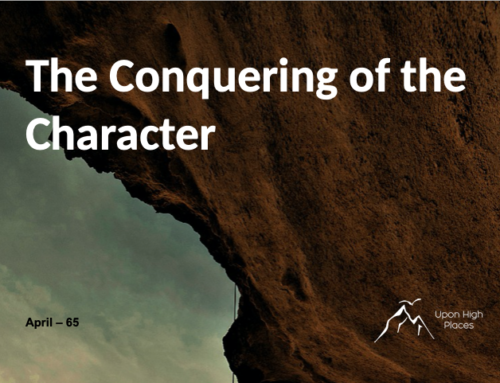Trust in God
April 2020
Dear youth:
I greet you in the name of the Lord Jesus Christ and ask that His blessings, love, and guidance be upon you in abundance.
Conceptualization
We will reflect on the words that appear in Psalm 37:5: “Commit your way to the Lord, Trust also in Him, And He shall bring it to pass.”
If there is one thing that human beings deeply value is the trust that people have in us and that which we place in them. When trust is lost, it is difficult to forge or continue a relationship of sincere and lasting friendship, since the basis of good understanding is trust in the other. We need to have confidence in the people around us and especially in God. What does having confidence mean? The term trust comes from Latin and means with faith; it is a firm and sure expectation of something from someone, which means that our confidence can be strengthened or weakened according to the reactions of those who expect something. Trust is a hypothesis about the future behavior of the other.
Placing trust in God
With this premise we can understand that when we wait for a blessing from God, his help and love, especially in the most delicate moments we have to go through, it is because we have developed trust in Him and in His Word. To trust God we must know Him, this is the secret. Do you seek the Lord each day? The Bible says: “Blessed is the man who trusts in the Lord, and whose hope is the Lord.” Jeremiah 17: 7. Which means that the one who decides to trust in God is happy. Why is it important to trust God? Because although we can place our trust in human beings, we know that they are fallible and prone to error, and especially limited in all areas. A man or a woman does not have all the knowledge in the world, nor do they possess the capacity to cure all illnesses or to free ourselves from all difficulties. We can trust that the person in whom we have placed our trust will do their best, but we know that there is a limit that cannot be surpassed; that’s where God comes in.
In this current time, experiencing the laceration of a viral pandemic worldwide, when you hear thousands of voices announcing future catastrophes and clamorous and suffering voices that rise to heaven, it is worth asking, how can trusting in God help me? In quite a lot, absolutely. Humans do their best to alleviate and eliminate the effects of this disease and we hope for the best. Each of us must become instruments of good, do our best to be part of solving problems. But when things happen that are beyond our control and that test our capacity to bear, we must trust God, because He has dominion of everything, yes, of everything in life. Let us not forget that: He divided the Red Sea in two, raised the dead, healed the sick, restored sight to the blind and gave speech to the dumb, walked on the waters of the sea; controlled the storm… and much more.
Do not be overwhelmed by what you hear and see, dear youth, just trust God and wait on Him. It is very easy to collapse and panic when the waters overflow. But when we learn to trust God, the first thing we do is leave everything in His hands and do the best on our part, that is, that which as humans we are given to do, because God will never do for us what He has given us the ability to do. If I can avoid an illness by acquiring healthy habits or following sanitary norms, then I should. It does not mean that I can now eat and drink and do what I want, trusting that nothing will happen to me. That is presumption, not faith. If we do our best we can rest on the foundation that lies in trusting God.
Now if in spite of my human efforts, good will, and correct attitude of life a problem befalls me, it is imperative that I learn to trust that God has promised to provide and to do the best for me. When we pray to God we must do it following the teaching of Jesus. The Master always prayed to his Father trusting that the answer he would receive would be what was best for Him. Three times he prayed like this in Gethsemane: “Father, if it is Your will, take this cup away from Me; nevertheless not My will, but Yours, be done.” Luke 22:42.
This is the most difficult and complicated part of the life of faith, and it is what we have to cultivate the most, since our natural tendency is to ask for what we like or believe is convenient for us. Sometimes we want a thing and we stubbornly get it, but do we know if it suits us? No, however, God does know what is best for us and, driven by His great love, goodness, and mercy, when we place our trust in him, he gives us what is best. It may not be what we expect, but surely it is in our best interest. It is what the apostle Paul teaches: “And we know that all things work together for good to those who love God…” Romans 8:28.
True love casts out fear
There are situations in life that cover us like a wave and it seems that they are going to overwhelm us. As already mentioned, the first thing we must do as Christians is to learn to trust God. He is the only one who can straighten the crooked and smooth the mountains of difficulties. We know from prophecies that this current event we are experiencing, as well as others that have already taken place, are forerunners of the second coming of Jesus. But we cannot be filled with fear as if we did not have a powerful God whom we can ask and trust in. Nor should we believe and pray motivated by this occurring calamity. Faith must always be cultivated, in every moment, place, and circumstance. What will happen when this pandemic passes? Could it be that people will continue to believe, pray, and fast with the same fervor? I don’t know. I wish it were so! But it won’t happen if people approach God out of fear (1 John 4:18).
It is not out of fear that we should prepare for the second coming of Christ, but out of love for Jesus. When preachers base their speeches on fear, people seem motivated to be more spiritual, but when they see that nothing happens they lose their fervor and quit. What the Word teaches us is that we must watch and pray at all times without ceasing (1 Thessalonians 5:17), because nobody knows the day or the hour of the second coming of Christ (Matthew 24:36). We shouldn’t seek God only when we see the water is at our necks, but also when everything goes well for us. Whoever studies the Bible knows that the return of Jesus a second time to this earth was announced from the first pages of Genesis. During the Old Testament this promise was reiterated and Christ himself and his disciples declared it bluntly. Hundreds of generations of Christians have awaited this event with joy in their hearts. We should not see the second coming of Christ as the end of the world, but rather the end of suffering, pain, and death. Is it not wonderful? It is not the end of human life, which is finite, but the beginning of eternal life, full of happiness and peace.
Conclusion
We need to learn to trust in the Word of God revealed in the Bible. That’s why we must study it every day, knowing that holding on to the Lord’s hand is the only thing that will sustain and comfort us in a world of constant turmoil, the only thing that will give us inner peace and emotional stability. God is love, he desires our wellbeing. That we end up in a hectic and disturbed mood is not in His plans. He wants to see us happy and supported by His immense love that He manifested to us on Calvary through the sacrifice of the Lord Jesus Christ. His love is immeasurable and will never cease to be. Thinking about this, making this truth our own, is what will give us vitality in the midst of crisis, oppression, and disease. The inspired text tells us: “The love which Christ diffuses through the whole being is a vitalizing power. Every vital part—the brain, the heart, the nerves—it touches with healing. By it the highest energies of the being are roused to activity. It frees the soul from the guilt and sorrow, the anxiety and care, that crush the life forces. With it come serenity and composure. It implants in the soul, joy that nothing earthly can destroy,—joy in the Holy Spirit,—health-giving, life-giving joy.” The Ministry of Healing, pg. 115. Remember the promise: “Put your life in the hands of the Lord, trust Him and He will come to your aid.” May God richly bless you.
Amen.
José Vicente Giner
Pastor and Youth Department Leader of the General Conference
For reflection:
1. Whatdoestheexpression”trustGod”mean?
2. InwhatspecialsituationscanwetrustGod?
3. DoestrustingGodmeanthatHewillalwayshelpus?







